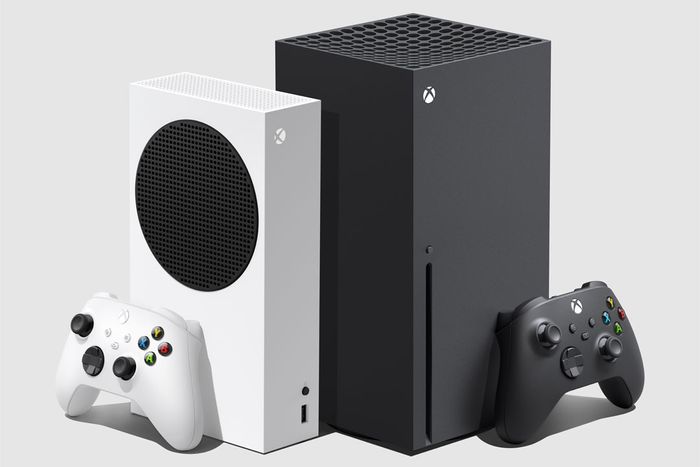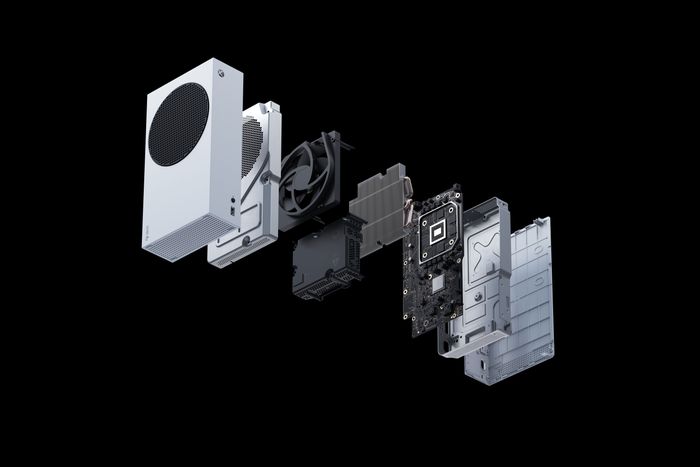
On November 10, you’ll be able to buy a new pair of Xbox consoles that could, if successful, fundamentally change the way video games are played and made from the ground up. The new Xbox Series X and its budget-friendly sibling, the Xbox Series S, are designed to be hubs in a Netflix-style ecosystem where, for a monthly fee, you can play just about anything, anywhere — for better or for worse.
As an entertainment industry, the video-game world has largely resisted the full-scale reinvention that has accompanied the advent of streaming media. Even as music, movies, and TV were recalibrated around streaming platforms, games had previously lacked a popular Netflix-style subscription service with a library of video games available on demand, for a monthly subscription. Microsoft believes it has that service in Xbox Game Pass.
Of course, some aspects of this innovation have been here for a while now, just in a different form, quietly slipped into the last-generation Xbox and on your smartphone. Game Pass first launched on June 1, 2017, and it has expanded dramatically in the intervening years. It now has a sister service for PC games, and Microsoft, leveraging its massive capital, has gone on a buying spree, purchasing studios big and small to ensure that Game Pass has a future as a premiere location for new video games. As these perks added up, Microsoft rolled them all into one subscription: Xbox Game Pass Ultimate, which costs $14.99 a month.
And now come the new consoles. I’ve had an Xbox Series X provided by Microsoft for review for a little over a week now, and while the squat machine does a lot of the cool new things that it’s promised to — load games incredibly fast (I waited, on average, no more than seven seconds between starting a game up and playing it); play them with Gemini Man–esque high frame rates that look strange in movies or TV, but are highly desirable for video games; and runs games with a level of detail approaching the absurd — the chief appeal of the console is Xbox Game Pass, and Microsoft’s unusual commitment to making games from its prior console libraries available. (Both the Xbox Series X and Series S will let you purchase and play games from a truly massive legacy library stretching back to the original Xbox released in 2001 — it’s not comprehensive, but it is impressive and thousands of games deep.)
Few things make this clearer than the Xbox Series X|S’s complete lack of new games exclusive to both consoles. While some of this fall’s big releases from third parties unaffiliated with Microsoft — like the gangster soap opera Yakuza: Like a Dragon or the Viking action game Assassin’s Creed: Valhalla — are coming with versions made for both new Xboxes, none were available prior to launch, and Microsoft has no new games of its own to showcase the raw power of their new machines. Instead, they have “optimized” a number of currently available games, like 2019’s sci-fi shooter Gears 5, an already-impressive looking game that now runs with a crispness that would have required a computer that costs more than the Xbox Series X’s $500 price tag.
Price is the elephant in the room this console generation. In the midst of a global pandemic, there’s little reason to invest hundreds of dollars in a machine that doesn’t yet have its own library of games. And here’s the unusual wrinkle: Microsoft is acknowledging this.
One of the company’s biggest talking points in the lead-up to the Series X and S has been a feature called Smart Delivery: a service that, should a game be available for both Xboxes new and old, would automatically provide you with the version suited for whatever console you had, and upgrade for free should you decide to move from the Xbox One to the Xbox Series S or X. It’s a very consumer-friendly move — in previous console release cycles, if you had a game on, say, the PlayStation 2, and there was a PlayStation 3 version, you just had to buy it twice if you wanted to see what the newer console could do.
But it’s also a tacit agreement to continue supporting the last generation of Xbox for the foreseeable future. Between Smart Delivery and Xbox Game Pass, if you have an Xbox One, Microsoft’s marketing wants you to know you won’t miss out on any big games. And, if you’re looking to save some cash, well, that’s what the Series S is for.
The Xbox Series S (yes, these names are all ridiculous) is a full $200 cheaper thanks to some shrewd compromises. It promises the same next-generation performance of the Series X — better graphical detail, load speeds, and more realistically rendered light — with a smaller hard drive (512 GB, roughly half of the Series X’s 1TB drive), no disc drive, and resolution locked to 1080p — the standard for High Definition, but not the buzzy 4K Ultra-HD most new TVs have. Think of it as the same machine, but less future-proof — should you get a nicer 4K TV, or slowly amass more than a small collection of games, you’ll soon have to spend more money.
This brings us back to Game Pass, and the most aggressive stratagem it has for enticing new customers. For an extra fee, you can finance an Xbox Series S or Series X as a part of your Game Pass. Dubbed Xbox All Access, the 24-month payment plan provides you with Game Pass Ultimate and a Series S or Series X console, for $24.99 or $34.99 per month, respectively. At this point, the transformation is complete: The Xbox is less a video-game console than a cable provider.
In the video-game industry tug-of-war between console manufacturers — these days, it’s mainly Microsoft versus Sony, since Nintendo proceeds at its own pace, currently to great success with the Nintendo Switch — innovation usually comes from the loser. Last generation, that loser was Microsoft, and as a result it has spent the past few years building a new framework for mainstream video games, one that brings it in line with the transformations that have come to other entertainment industries.
For the most part, it works. It is dazzling to open up Game Pass for the first time and have a massive library of games available to download. It’s unreal to learn that you can also stream those games to an Android phone and play wherever there’s a good enough internet connection. It is nice to not feel any pressure to upgrade from my Xbox One, or to have the option to get the more affordable Series S if my funds are limited.
Yet it gets troubling when I extend my view beyond my own personal convenience.
Despite being the benchmark for entertainment in the internet era, Netflix has yet to prove itself a truly sustainable business, obscuring the successes of its programming with byzantine numbers and meeting revenue goals while also racking up $15 billion in debt as it continues to produce more and more content. The ways it has disrupted the film and television industry are now being felt in mediocre content that’s now judged on its own scale. (Similarly, Spotify has reshaped audience expectations for music and developed a reputation for shortchanging artists.)
It will be some time before we know how the Netflix approach will impact the video-game industry, but the long-term view from other industries is not positive. It trades short-term convenience for the customer for long-term corporate hegemony: Smaller studios are forced to align with bigger companies that host them on their platforms, content is reevaluated by how it drives subscriptions, and the share of profits that go to creators plummets. But to the cash-strapped individual who wants to game, it’s hard to say no to a monthly bill that’s negligible compared to the $70 price tag new games will now carry. (Not to mention the appeal of games as a renewable source of entertainment and community in a lonely pandemic winter).
The Xbox Series X and S are less a new generation of console than they are a new argument for the shape and form of the video-game industry. In this, they are fascinating, if only in how its entire rationale is in reinventing a singular and idiosyncratic medium so that it looks like everything else.





